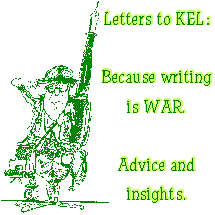Letters to KEL: The Dreaded Homonyms
 Homonyms: sound-alike words. Using perspective when you mean prospective. Using their when you mean there. It's for its. Adapt for adopt.
Homonyms: sound-alike words. Using perspective when you mean prospective. Using their when you mean there. It's for its. Adapt for adopt.Some people may say, "Well, it's close enough to what you mean, people can figure it out, so why does it matter to get the right word?"
IT MATTERS.
To misquote Mark Twain: Using the right word is the difference between lightning and a lightning bug.
If you want to be a writer, you have to get it right -- that means the details, that means the mechanics. If you don't care about the details, why should your readers care about the story you want to tell? If you have a story to tell, and you're going to spend the time getting the rest of it "right," why wouldn't you make the effort to use the right words?
If you're going to take the time to weave together the story so it makes sense, so it catches and holds the reader's attention, so the reader cares about the characters, the conflict, the danger, the goals, the tension -- why would you get sloppy when it comes to the actual words and the meanings of the words you use to tell the story?
It makes me want to pull out my hair, to read stories where the words are so badly chosen, so very wrong for what I know the writer means, that it distracts me from the story. You don't want to frustrate the reader, to the point of putting down the book and not picking it up again, do you?
So learn the difference between affect and effect -- between insure, assure and ensure -- adapt and adopt -- perspective and prospective -- their, they're, and there -- its and it's -- or, are, our, and hour -- fare and fair -- on and on. Learn what the words mean, and use them correctly!
Published on February 06, 2014 03:00
No comments have been added yet.



